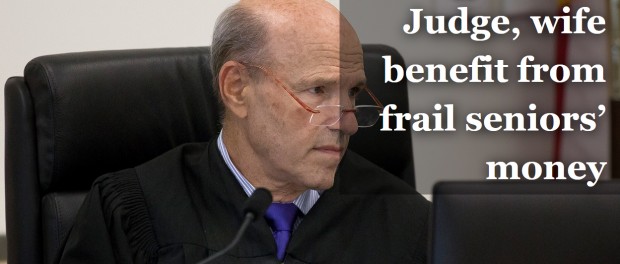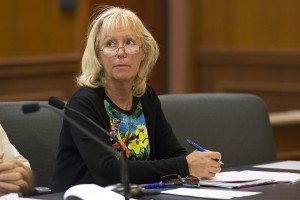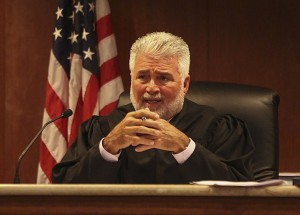Florida: Judge, wife benefit from frail seniors’ money, Part 1
 Judge Martin Colin hears guardianship cases, but not those of his wife. However, he hears other cases involving her lawyers. A former Florida high court justice says it looks improper and could violate the Judicial Code of Conduct. Judge Martin Colin, a fixture at the south county courthouse, was admonished by an appeals court in 2007 for conflicts involving Savitt after he represented her in her divorce. (Madeline Gray / The Palm Beach Post)
Judge Martin Colin hears guardianship cases, but not those of his wife. However, he hears other cases involving her lawyers. A former Florida high court justice says it looks improper and could violate the Judicial Code of Conduct. Judge Martin Colin, a fixture at the south county courthouse, was admonished by an appeals court in 2007 for conflicts involving Savitt after he represented her in her divorce. (Madeline Gray / The Palm Beach Post)
The first in a series of articles from Florida’s Palm Beach Post, written by John Pacenti, Palm Beach Post Staff Writer, and produced by Kristyn Wellesley and Gurman Bhatia
The savings of incapacitated seniors flow into the household of Palm Beach County Circuit Judge Martin Colin.
This occurs courtesy of Colin’s wife — Elizabeth “Betsy” Savitt. She serves as a professional guardian, appointed by judges to make decisions for adults who no longer can take care of themselves.
Savitt makes her money off the nest eggs of the elderly, many suffering from dementia and put in guardianships in the same Probate & Guardianship Division where Judge Colin wields considerable influence. His fellow judges approve Savitt’s fees.

‘I’m the wife of a judge’: Some familes say Elizabeth Savitt, a professional guardian, cites her husband’s position when they complain. (Madeline Gray / The Palm Beach Post)
Savitt has taken money from the elderly people whose lives she controls without first getting a judge’s approval as well as double-billed their accounts, a Palm Beach Post investigation has uncovered in court records. Families of some of the seniors say the judge’s wife and her attorneys drum up unnecessary litigation that runs up fees, benefiting herself, the judge and her lawyers.
Savitt doesn’t appear before her husband, but Judge Colin does oversee other guardianship cases where he is responsible for safeguarding the finances and well-being of these “wards” of the court. Colin’s colleague, Circuit Judge David French who lunches with him regularly, has overseen almost two-thirds of Savitt’s cases. Some lawyers who have opposed Savitt in Judge French’s courtroom say he didn’t disclose that Savitt is the wife of a fellow judge or his social connections to the couple.
The lawyers Savitt has hired to represent her also practiced before her husband in other cases, where he had the power to approve their fees. A former Florida Supreme Court chief justice and a law professor say this constitutes, at minimum, an appearance of impropriety and should be investigated.
“This conflict puts the whole courthouse under a cloud because it raises so many questions and there are no answers forthcoming. And that is why we have a judicial canon on the appearance of impropriety, so there are no questions like this,” Nova Southeastern law Professor Robert Jarvis said.

Lunches with husband: Judge David French hears the majority of Savitt’s cases. He lunches with her husband every day. (Damon Higgins/The Palm Beach Post)
The guardianship arena is an attorney’s playground. Everyone – the elderly ward, the guardian, relatives of the senior – are lawyered up. And most, if not all, get paid out of the savings of the senior in guardianship.
Families wonder if their lawyers naturally would be gun shy in opposing Savitt, a wife of a judge who they must appear in front of in other, more lucrative, cases.
This isn’t the first time Colin has had a conflict involving his wife and her lawyers. An appeals court in 2007 barred the judge from presiding over a case involving Savitt’s divorce lawyers, ruling he had an “apparent conflict of interest that would cause a reasonable litigant to have a well-grounded fear of not receiving a fair trial.”
115 Recusals in 6 months
This elaborate dance plays out in south county in the lucrative Probate & Guardianship Division, where Colin is a longtime sitting judge.
His wife’s job as a professional guardian leaves Judge Colin compromised, handcuffing him from fully doing his job, The Post found. He’s recused himself from 115 cases that involve his wife’s lawyers in the last six months of 2015 after The Post started asking questions in its investigation.
“When you have a judge suddenly recuse himself of so many cases, it certainly sends up a red flag,” Jarvis said. “How did a judge allow himself to be put in such a position? I have never heard of a judge doing such a thing.”
But Judge Colin doesn’t see a problem. Even before his recent mass recusals, he remarked in a court hearing that in the past he had required his wife’s attorneys to tell opposing lawyers that they represented Savitt.
But at least one attorney told The Post that’s not always how it worked. Gary Susser gave an example in which Colin’s disclosure policy fell short, saying he was “floored and shocked” when he found out about the conflict.
Attorney Sheri Hazeltine didn’t tell Susser until April that she works for Savitt, almost a year into a probate case, Susser said.
“She never disclosed her relationship until she was told by Judge Colin to do so,” he said. “It’s a huge concern for me when opposing counsel represents the judge’s wife.”
A transcript of the hearing shows Colin asking Hazeltine to disclose, she does so and then Susser objected to Colin continuing to preside over the case.
“It was news to me what I just found out,” Susser tells Colin.
Colin responds, “OK. That’s why we make what we call a disclosure.”
“Yeah,” Susser responds.
Colin then defends the policy that he would change later in the summer: “Can’t disclose until it’s, you know, ripe to disclose,” he tells Susser.
Colin had the case reassigned to another judge.
The judge spoke to The Post for hours, but because of his position, was limited in what he could say. He would only say on the record that he has dealt with the conflict with his wife properly through established methods.
…. To be continued….
To read this complete article online at the Palm Beach Post website, click here.





